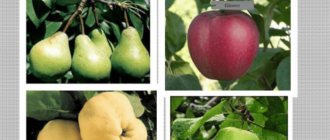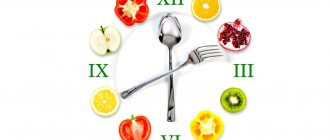I know many people who eat fruit instead of dessert after their main meal. They think that by giving up sugar and baked goods, they are benefiting their body, not even realizing how much they are harming the intestines by eating fruit after the main meal.
After visiting a gastroenterologist, I began to eat fruits the way she taught me. The bloating and other minor digestive problems immediately disappeared.
Vegetable salad
The second option for a healthy snack is a vegetable salad. You can prepare it at home or buy it at the store. Of course, it's better to take the salad from home. There you can season it with very healthy olive oil, but in the store you will only be offered a dressing made from harmful mayonnaise. And don’t try to use a lot of ingredients. It will be enough to cut tomatoes and cucumbers, or chop lettuce leaves and add some canned corn to them - and your snacks at work will be healthy.
Apples.
The best time for apples will be in the morning. Due to its high pectin content, eating an apple will help digestion and also have a negative effect on carcinogens. It is better not to eat apples in the evening, as they increase the acidity of the stomach, which can cause discomfort. You should also remember that pectin is poorly digested at night.
Calorie content and nutritional value of apples:
| Proteins (gr.) | 0,3 |
| Fats (gr.) | 0,2 |
| Carbohydrates (gr.) | 14 |
| Calorie content (Kcal.) | 52 |
Content of vitamins, minerals and trace elements:
| Sodium | 1 mg. |
| Potassium | 107 mg. |
| Vitamin A | 54 IU |
| Calcium | 6 mg. |
| Vitamin C | 4.6 mg. |
| Iron | 0.1 mg. |
How much fruit should you eat every day?
Proper nutrition involves eating fruits in the right quantities. But how to determine the exact number? You have two options: agree with the WHO opinion or take into account the latest 2017 study by scientists from Imperial College London.
Experts analyzed 95 scientific papers on the relationship between nutrition and health. They concluded that the more fruits and vegetables in a person's diet, the better.
Here's how the number of fetuses affects the risk of premature death:
- 400 gr. - 15%;
- 800 gr. – 31%.
800 gr. – this is approximately 10 servings. That is, to prevent chronic diseases, you can eat 5 medium fruits and the same amount of vegetables every day.
Is it possible to eat oranges at night when losing weight?
A person who is controlling weight or trying to lose weight can have an orange before bed. Eating a low-calorie product has a beneficial effect on health and overall well-being.
A few slices of orange quickly and for a long time provide a feeling of satiety, which will help you refrain from consuming unhealthy foods at night. The orange fiber swells under the influence of gastric juice, fills the space in the intestines, and the person will no longer experience the feeling of hunger.

Dietary fiber from oranges contributes to weight loss to some extent:
- cleanse the intestines of accumulated waste and toxins;
- stimulate intestinal motility;
- normalize stool, eliminate constipation;
- restore intestinal microflora;
- prevent the development of dysbacteriosis;
- accelerate the metabolic process of fat breakdown, thereby preventing the formation of new fat deposits.
Oranges contain increased amounts of folic acid, potassium, and magnesium, which regulate all types of metabolism in the body. Vitamin E in combination with retinol and zinc suppresses appetite, improves skin condition, reduces the appearance of cellulite, and relieves the body of edema.
Orange is valued for weight loss due to the presence of B vitamins. They stimulate the production of hormones responsible for the breakdown of fats, reduce the concentration of cholesterol and sugar in the blood, and support the health of the thyroid gland, dysfunction of which contributes to obesity.
For reference. B vitamins have a beneficial effect on the state of the nervous system, increase resistance to stress, ensure a good mood, normalize night sleep, which in turn allows you not to overeat and get rid of the need to “eat stress.”
Orange contains high doses of vitamin C, which is important for the natural reduction of fatty tissue in the body. Ascorbic acid removes excess cholesterol and sugar, normalizes lipid metabolism, strengthens the immune system, regulates oxidation-reduction reactions, stimulates the secretion of bile, and restores the functions of the pancreas and thyroid gland.
Calorie content and BZHU
The calorie content of orange fruit is 40 kcal, and the protein/fat/carbohydrate content is 0.9 g/0.2 g/8.1 g.
Depending on the variety, weather and climatic conditions of growth, and the degree of ripeness of the fruit, oranges have different chemical compositions.
On average, 100 g of edible part contains:
- organic acids;
- alimentary fiber;
- ash;
- water;
- sugar: glucose, fructose and sucrose;
- vitamin A;
- beta-carotene;
- B vitamins: B1, B2, B3, B4, B5, B6, B9;
- vitamin C;
- vitamin E;
- vitamin H;
- vitamin PP;
- trace elements: iron, iodine, manganese, selenium, cobalt, copper, fluorine, zinc, chromium, molybdenum;
- macroelements: potassium, calcium, silicon, sodium, magnesium, sulfur, phosphorus, chlorine;
- sugars: glucose, fructose, sucrose;
- amino acids: aspartic, glutamic, lysine, glycine, tyrosine, serine, leucine, arginine;
- omega-3 and omega-6 fatty acids.
How to properly combine fruits with other foods?

So, it is better to eat sour ones with sour ones, sweet ones with sweet ones, and so on. It is advisable not to take more than 2-3 types of fruit for one meal, since separate meals are most effective here. This will allow them to be digested faster and absorbed better, and will prevent fermentation in the stomach and bloating.
Let's list the different types of fruits:
- Sweet
. These include dates, bananas, apples of appropriate varieties, pineapples, persimmons, mangosteen, tamarind, sapodilla, and marang. All this can be combined in one fruit salad, topped with yogurt or kefir. Such fruits go well with dairy products; they can be crushed in a blender and added to curd mass or ice cream. - Sour
. This group should primarily include kiwi, tangerine, oranges, mangoes, figs and pomegranates. All this is in perfect harmony with each other, but if desired, it can be supplemented with fermented milk products - kefir, cream, cheeses (brynza, Adyghe, feta). Various nuts are ideal for them, especially walnuts, chicken meat, and some types of vegetables - Chinese cabbage, canned corn, bell pepper. But when using the latter, dairy products are not recommended to avoid diarrhea. - Sweet and sour
. These include plums, pears, apricots, and nectarines. All this also goes well with dairy products, but is not suitable for combination with vegetables, sour and semi-acidic fruits.
It is highly not recommended to combine fruits with sausages, meat (except chicken), eggs and fish in one dish. In this case, they will become very heavy food for the stomach and will take longer to digest, causing some discomfort.
Also, you should not experiment with pure milk, especially you should not drink apples, pears, plums, etc. with it, otherwise diarrhea may occur.
What happens when fruit is eaten along with heavy food?
Have you ever thought about what happens in your body when foods that are digested quickly and for a long time immediately enter it? What happens is this: heavy protein foods retain light fruits, as a result of which they simply begin to ferment.
If you spill tea or juice at the Christmas table, success awaits you: signs
Salt water, honey: soothe sensitive teeth with home remedies
The stunning rise in Bitcoin value gave way to a rapid decline
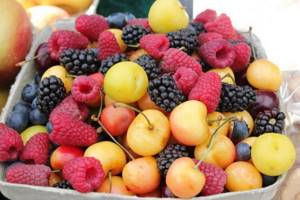
Even if you eat fruit immediately after lunch or dinner (this is a very common practice in many families), they end up in a kind of “trap” in the stomach, unable to be properly digested. Once blocked by protein foods (such as meat or fish), they are susceptible to environmental conditions of heat and moisture, resulting in the process of fermentation. The vitamins contained in fruits are destroyed before reaching the intestines, where they are absorbed by the body, and metabolism is also disrupted. All this leads to active gas formation, bloating and other unpleasant sensations in the stomach.

The healthiest and most affordable fruits in the diet
Fruits come in many varieties, each with their own properties: consider them when determining your diet.
Apple
One apple a day may be enough to keep you from seeing a doctor:
- contains phenols - substances that normalize cholesterol levels in the blood. As a result, the risk of developing heart and vascular diseases is reduced. The feature was confirmed by research conducted by doctors Athanazios Koutsos and Samantha Ricadonna;
- The apple also contains antioxidants - components that prevent the occurrence of chemical reactions dangerous to the body caused by free radicals. Flavonoids present in the fruit protect against Alzheimer's and Parkinson's diseases. According to nutritionist Jacqueline London, the substances improve brain activity in general;
- apples stimulate the production of bile and gastric juice, which is good for digestion.
How should I include a component in the menu? Give preference to red varieties, which contain more anthocyanins - substances that have a beneficial effect on cholesterol levels. They are also richer in fiber, calcium, phosphorus and vitamin K. But Granny Smith is higher in vitamin A, so add that variety to your diet as well.
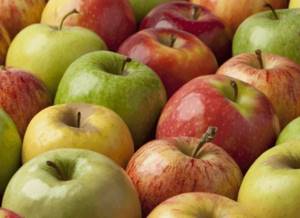
The advantage of apples is that they can be heat treated. Some vitamins will be destroyed, but instead of them, the antioxidant pectin will be formed - a component that protects against aging. It prevents the development of cancer, so add baked apples to your diet.
Pear
The list of healthy fruits also includes pear: 2 pcs. per day will complement your menu. One medium-sized fruit contains the following nutrients:
- 1 g protein;
- 27 g carbohydrates;
- 6 g dietary fiber;
- 12% of the daily value of vitamin C;
- 6% of the daily value of vitamin K.
Pears are also a source of copper, which strengthens the immune system and has a beneficial effect on the nervous system. One fruit is enough to cover 16% of the body's daily needs. The product also contains potassium, which is responsible for heart function and muscle contraction.
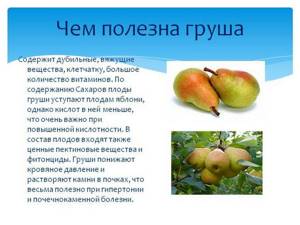
Pears also contain polyphenols, antioxidants that protect cells from free radicals. There are 6 times more of them in the peel than in the pulp, so eat the whole fruit. And the flavonoids contained in pears reduce inflammatory processes in the body. The benefits of the component were proven by observations conducted as part of the Baltimore Longitudinal Study of Normal Aging.
Plums
One fresh plum contains only 30 kcal. But it is rich in nutrients:
- 1 g dietary fiber;
- 8 g carbohydrates;
- 5% daily value of vitamin A, 10% of vitamin D, 5% of vitamin K.
Plums contain polyphenols - substances that strengthen the skeletal system. They reduce the risk of developing diabetes and cardiovascular diseases. Research conducted at the University of California by doctors Maria Gil and Francisco Tomas-Barberan showed that plums contain more beneficial components than peaches and nectarines. And animal experiments conducted at Cornell University confirmed the anti-inflammatory effect.
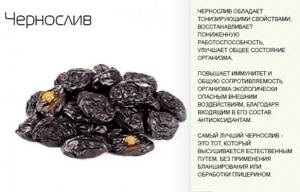
Plum and its fresh juice help with constipation, although you should not lean on the product. Limit intake to 45-85 grams per day to avoid diarrhea.
Oranges
Oranges will help you get the required amount of vitamin C and potassium. They also contain flavonoids - plant pigments that slow down inflammatory processes in the body. Nutritionist Jennifer Hyland recommends them for those planning a snack before a run or other aerobic activity.
Orange contains 3 types of sugar:
- glucose;
- fructose;
- sucrose.
But the component has a low glycemic index - the natural substance is slowly absorbed. The indicator is due to the high content of polyphenol and fiber, which slow down the rise in blood sugar.
The downside of orange is that it is often consumed in juice form. The store-bought product contains regular sugar, which affects body weight. Oranges also contain acids that affect tooth enamel. The harm is comparable to that caused by sweet soda, one of the main causes of tooth decay.
Nutritionist Jacqueline London still does not advise giving up oranges. Eat a citrus fruit a day, and then drink a glass of sparkling water to normalize the acid-base balance in your mouth.
Bananas
Bananas are known for their high potassium levels, giving you 12% of your daily value. It is also rich in carbohydrates, and they are found mainly in green fruits. They contain resistant starch, a substance that is resistant to digestion. According to the observations of doctors A. Raben and A. Tagliabu, conducted in Denmark, the component creates a feeling of satiety for a long time.
Bananas also contain pectin, a substance that has a beneficial effect on the digestive system. Research conducted at the State University of New York speaks about its benefits. In their course, it was possible to prove that pectins help with sugar intolerance.

Bananas can be included in your diet, but you shouldn’t rely too much on them, just like any other component. 1-2 per day is enough, and choose fruits that are not too ripe.
Exotic fruits: harm or benefit
Nutritionists from the National Center for Complementary and Alternative Medicine recommend eating pineapples. They contain bromelain, an enzyme that promotes weight loss.
The center’s doctors also conducted studies that showed that the component helps with sinusitis. There are also suggestions that bromelain is useful for osteoarthritis, but additional experiments are needed for a final conclusion.

Avocados are also considered exotic varieties; the American Heart Association has stated the importance of this fruit for humans. It contains monounsaturated fats, which reduce the likelihood of stroke and heart attack.
The following exotic varieties are distinguished:
- Durian is rich in vitamin C - 1 cup of pulp satisfies 80% of the daily requirement. It contains copper, folic acid, manganese and antioxidants, which is why it is called the king of fruits;
- guava completely covers the daily need for vitamin C. It reduces the risk of developing chronic diseases, which was proven by observations conducted at a private university in Taiwan;
- Papaya contains the antioxidant lycopene, a component that has an anti-cancer effect. Its properties were confirmed by doctors Aneta Gadzhovik and Malgorzata Dobrynska.
But not everything is perfect, because the exotic fruits on supermarket shelves were picked a couple of months ago. The beneficial substances in them lose their potency, so you can refuse rare treats.
If you come to the country of origin of guava or durian, be careful. Unusual substances put a strain on the liver and stomach, so start with a small portion. Regular seasonal fruits will still be safer if they are grown in environmentally friendly conditions.




